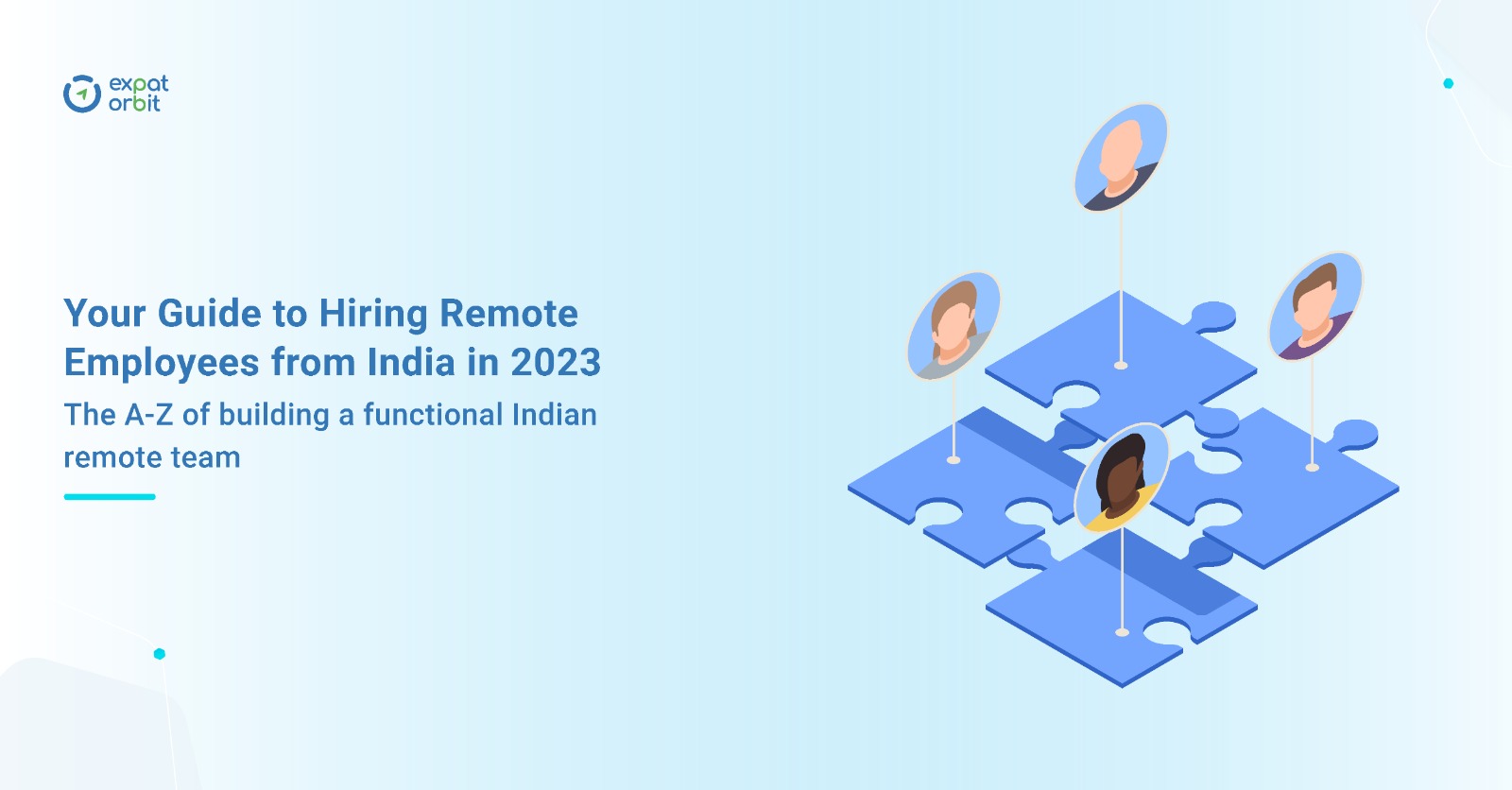While you want to take advantage of India’s highly skilled workforce for your business, how should you go about hiring people from here? After all, India is not your country and you practically know nothing about how things work here.
Here is our detailed guide explaining you how to make your first remote Indian hire-
1. Obey the law of the land
To be legally compliant, a foreign employer must fulfill employer-related obligations, such as payroll management, withholding, depositing tax and social security contributions, et al. To manage this, they would need to establish an entity in India.
This is a strenuous process and in all likelihood not very appropriate for the initial stages of your organization’s India journey.
So here are some alternative approaches that you can consider -
- engaging freelancers,
- hiring contractors,
- outsourcing a certain piece of work to a third party, or
- partnering with an Employer of Record (EOR)
2. Define your employee persona
We can’t overstate how important this step is, given you are hiring from a country you are not very familiar with. Prepare the job description (JD). Based on this JD define your ideal employee.
For starters, bear in mind things like -
- The Indian equivalent of the qualifications needed to perform the job. E.g., a Bachelor of Sciences (B.Sc) in the US is commonly known as a Bachelor of Technology (B.Tech) in India
- Relevant educational institutes from India that help you determine the authenticity of the application. E.g. IITs, NITs, MNITs, etc. for technical roles; IIMs, ISB, etc. for management education, and so on
- Language proficiency required, based on the degree of coordination needed between home and remote teams, as well as client facetime needed. (Fun fact: India has the second largest English-speaking population in the world, just after the US).
It may look like ‘not a big deal’ to go ahead with vague requirements. But the eventual time and cost disadvantage of working with an unsuitable candidate make the initial effort at this stage extremely critical.
3. Decide the compensation to be offered
Defining the compensation structure to be offered to remote employees is crucial - both for your budgeting and your remote employees’ motivation.
- Understand India-specific compensation components like basic pay, house rent allowance, leave travel allowance, provident fund, meal passes, bonuses, telephone reimbursements, etc.
- Understand taxation of compensation arrangements, such as the grant of ESOPs or SARs
- Failure to incorporate the legally required and industry-benchmarked benefits can demotivate your remote employees and hamper their long-term association with your organization
4. Ensure optimal infrastructural set up
Your remote employees should never miss office due to inadequate infrastructural support
CASE A: Your remote employees work from their homes
Considerations like laptops, data security norms, allowances to ensure undisturbed internet connectivity, etc. will be key
CASE B: Your remote employees work from a centralized location in India
Finding the office space, ensuring that it is equipped with appropriate infrastructure - internet connectivity, ease of commuting for employees, security of your intellectual property, etc.
5. Let the hiring begin
Here is how you can search for your potential employees in India-
Online recruitment portals such as Linkedin, Naukri, Monster, Indeed, etc.
Go on these websites to search for suitable candidates, reach out to them personally, ascertain their suitability and then schedule them for interviews.
Recruitment agency
A much quicker way can be to engage a recruitment agency. Engaging a recruitment agency will be beneficial if you plan to hire at regular intervals and are unaware of the tenets of the Indian job market. You still need to invest time and effort in perfecting your JD, but the agency can guide you on India-specific requirements.
Outsourcing to a third party
If you need to get a project implemented, for which your home team lacks specialized skills, you can choose to outsource it to a third party. You simply enter into a contract with the agency, which then deploys its own employees for the designated period of time on the project. They generally also appoint a manager to oversee the execution who also acts as your contact point.
In this scenario, however, you need to share all project information, relevant requirements, and confidential data with the agency. In the case of smaller projects, this can be an appropriate solution. But in the long term this can prove to be more expensive with less control over timelines, quality, and confidentiality of your information.
6. Screening applications and conducting interviews
It will help if you are aware of local Indian terms, or have assistance from an Indian-origin HR to understand the profiles and their fit. People sometimes upload their resumes, only for assessing their market compatibility. Buffer your time, patience, and resources for at least 20% of such applicants.
7. Background verification
Once you have finalized the candidates, it will be important to perform background verifications. Because they are sitting in a different country, it will be difficult to do this yourself. You may consider hiring a verification agency for this. Remember, to have honest conversations and expectation-setting with the candidates before they are finalized.
8. Onboarding
Remember to have an extremely warm and welcoming employee onboarding, especially because they will be working remotely.
The employment contracts that you roll out should be framed keeping in mind the requirements from Indian labor law and other applicable statutes. E.g., minimum maternity leave of 26 weeks for working women, mandatory contribution to the provident fund at 12% of salary by employer and employee, etc.
It is also important to use the right terminologies, depending upon the relevant onboarding arrangement. E.g., contract for a contractor will be different from that of a freelancer, an employee will have a differently worded contract. Not using appropriate words may lead to misclassification, resulting in hefty outflows on account of penalties, taxes, and social security contributions
You may choose to engage with local legal/payroll consultants to draft compliant employment contracts for remote employees.
The real cost of hiring remote teams
While everything above may seem like a normal recruitment process, the twist of cross-border remote working elevates it to another level, necessitating additional time, effort, and money investment.
So, while calculating the cost of hiring remotely in India, also factor in additional costs such as:
- Local Indian assistance to draft appropriate JDs
- Engaging recruitment consultants, or a third party
- Involving legal consultants for contract framing/ reviewing
- Engaging a background verification agency
- Dedicated HR contact point to manage all cross-border employees
- Payroll consultants to assist in compensation structuring
How Expat Orbit’s EOR helps with this and beyond
An EOR like Expat Orbit can ease the process of hiring remote teams, by stepping in as the legal employer in India, so that your company does not need to establish a legal entity in India. But you choose and finalize the candidates to be on-boarded by the EOR provider. Thereby, still leaving the recruitment process upon you.
For its success as an EOR in India, Expat Orbit has even been independently judged as one of the top EORs in India by RemotePad.com.
With our support, you can fully leverage the benefit of hiring remote teams from India, instead of getting it overshadowed by the hidden cost, time, and effort of managing recruitment. To know more about the full suite of EOR services that we provide, pay us a visit here.


